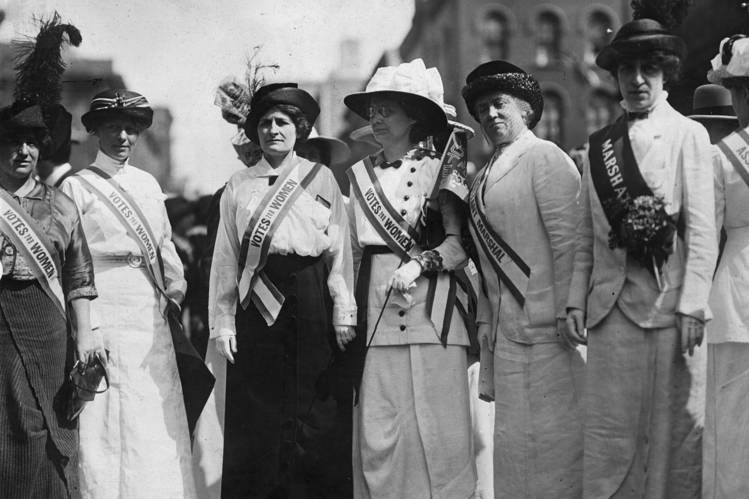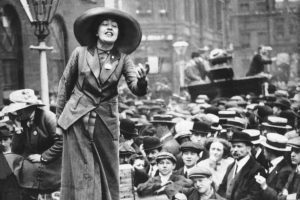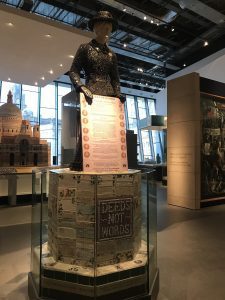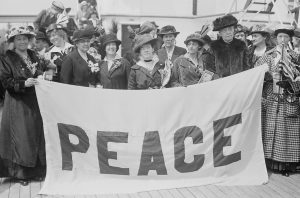Written by: on February 6, 2018
100 years ago today, The Representation of the People Act 1918 (passed by an all-male, all-white Parliament) extended the franchise to all men aged 21 and above – previously men over the age of 21 who lived with their parents, employers, in barracks or were homeless, were not entitled to vote. And for the first time, they extended the franchise to women. Yet whilst we agree that the 1918 Act is a poignant moment in women’s herstory, we must not forget that women were not actually granted the same electoral equality as men until a full decade later. On this day, we thought it was a good time to remember those who fought for our right to vote and to reflect on the progress made in the last 100 years.

1918 most certainly marks the year that the franchise was (finally) opened up to women. During the war, the blood, sweat and tears of the women who slaved away on the home front and the pre-war suffrage movement gave cause for the men in power to consider granting some women the right to vote. These women, who were lucky enough to be granted the vote in 1918, were those over the age of 30 who were a member or married to a member of the Local Government Register, a property owner, or a graduate voting in a University constituency. In other words, the right to vote was mainly given to the middle and upper class.

Realistically this meant that very few women who kept the country afloat during the war effort, whether that be risking their lives making ammunitions or spending days in the fields ensuring families didn’t go hungry, were actually granted the right to vote after the war. Those granted the right represented only 40% of the female population in Britain at the time. Yet the Act was a crucial point in the suffrage movement, as it meant that change was possible.

It wouldn’t be another ten years until women would be granted equal voting rights as men. The Representation of the People (Equal Franchise) Act 1928 significantly widened suffrage and gave women the same electoral equality. All women over the age of 21 were granted the right to vote, regardless of property ownership. The passing of the Act saw a further 5 million women added to the electoral register and resulted in making women the majority of the electorate in the 1929 general election in which the Labour Party, under Ramsey McDonald, won the most seats in Parliament for the first time.
If we had a pound for every time someone gave us a funny look and said, “Don’t you mean the Suffragettes?”, when mentioning the Suffragists we would be very rich! It is easy for the role of the Suffragists in the movement to get lost in all the noise of the militant Suggrattes, which is why we think it’s important that on this day both strands of the movement are acknowledged.

The Suffragists formed in the late 1800s when a number of women’s suffrage societies merged to form the National Union of Women’s Suffrage Societies (NUWSS) under the leadership of Millicent Fawcett. The organisation chose peaceful, non-violent tactics to portray the intelligence and law-abiding nature of it’s members. Fawcett believed that by acting in this manner, women could prove they were respectable and responsible enough to participate in politics.

The Suffragettes formed as a sub-group of the NUWSS when Emmeline Pankhurst became dissatisfied with the slow, respectable tactics of the organisation. Alas, the Women’s Social and Political Union (WSPU – the term ‘Suffragettes’ was given to the organisation by The Daily Mail) was in Manchester. The radical approach of WSPU grabbed the attention of the newspapers and history so it seems.

It is largely debated among historians which group was more effective in it’s advocacy. The Suffragists were respected by politicians for their peaceful approach, whilst the Suffragettes were most certainly not, especially when they targeted the lives and private properties of notable politicians at the time. However, some believe the Suffragettes were vital to the movement because they kept the cause in the public eye. Both groups were made up of largely middle-class white women, which surely had a role to play in the delay in giving all women equal footing as men in the franchise. When the war broke out, both groups scaled back to contribute to the war effort, which many historians believe led to the extending of the franchise in 1918.

In 2018 the feminist movement appears to be just as strong as when women across the British Isle were fighting for equal voting rights, with the Women’s March, #MeToo and #TimesUp movements surging. A century has passed and there is still so much to be done in politics, in industry and in everyday life to advance equality for all. It’s hard to believe that 100 years after the franchise was extended to women in Britain there are still counties that are yet to even implement this basic right.
Like the Suffrage movement, the modern feminist movement is often criticised for being too white and middle-class. In 2018, let’s celebrate 100 years of the franchise being open to women for the first time. And let’s all evolve the movement to ensure marginalised and diverse women’s voices are heard too.
Do you want to find out more about the local suffrage movement in Liverpool? Visit the Liverpool Museumto view their wonderful free display, curated by the 1918 club.
Back to news and viewsApril 22, 2024 - Lauren